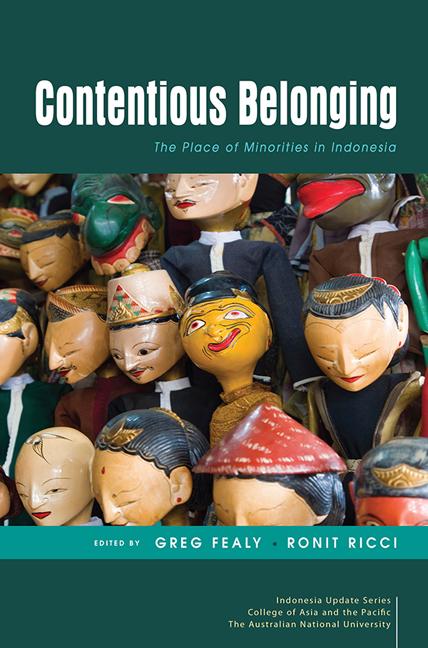Book contents
- Frontmatter
- Contents
- Tables and figures
- Contributors
- Acknowledgments
- Glossary
- Map
- 1 Diversity and its Discontents: an Overview of Minority–Majority Relations in Indonesia
- PART 1 HISTORY AND LAW
- 2 Minorities in Indonesian History: From Ambiguous Advantage to Cantonisation
- 3 Minorities and Discrimination in Indonesia: the Legal Framework
- 4 The Constitutional Court and Minority Rights: Analysing the Recent Homosexual Sex and Indigenous Belief Cases
- PART 2 DISABILITY
- PART 3 SEXUALITY
- PART 4 RELIGION AND ETHNICITY
- PART 5 REFLECTIONS
- Index
- Indonesia Update Series
2 - Minorities in Indonesian History: From Ambiguous Advantage to Cantonisation
from PART 1 - HISTORY AND LAW
Published online by Cambridge University Press: 06 September 2019
- Frontmatter
- Contents
- Tables and figures
- Contributors
- Acknowledgments
- Glossary
- Map
- 1 Diversity and its Discontents: an Overview of Minority–Majority Relations in Indonesia
- PART 1 HISTORY AND LAW
- 2 Minorities in Indonesian History: From Ambiguous Advantage to Cantonisation
- 3 Minorities and Discrimination in Indonesia: the Legal Framework
- 4 The Constitutional Court and Minority Rights: Analysing the Recent Homosexual Sex and Indigenous Belief Cases
- PART 2 DISABILITY
- PART 3 SEXUALITY
- PART 4 RELIGION AND ETHNICITY
- PART 5 REFLECTIONS
- Index
- Indonesia Update Series
Summary
Minorities have been a volatile phenomenon in Indonesia's social and political history for centuries. Over time, minority identity has been shaped by the imperatives of trade, by ideas of ritual purity and power, by ethnicity, by national allegiance, by religious affiliation and by lack of access to the full privileges of citizenship. Older forms of identity have existed alongside, and have sometimes intersected with, newer forms.
In today's world, we are accustomed to seeing minorities as disadvantaged. To belong to a minority is to have less than full acceptance as a citizen in the state where one belongs. It is to be treated, at least in some respects, as being alien in one's own country. The consequences of minority status range from neglect, social marginalisation and legal discrimination to forced assimilation, exclusion, expulsion and even extermination. In understanding minorities as communities under siege by their host societies, we quite correctly invoke the language of human rights and we propose remedies underpinned by law and education. If we are to chart a way forward, however, we need to understand that, historically, minority status has sometimes delivered advantage to the minorities themselves and to the host community. Minority status in Indonesia has been the product of complex social and political forces that have shifted over time. Minorities change character and sometimes disappear as historical circumstances change. We are now in the midst of a major change in the configuration of Indonesia's minorities.
Two categories of minority—trading minorities and ritual minorities (that is, minorities defined by perceived ritual ‘impurity’)—were known in the Indonesian archipelago in early times. The more important were the foreign trading minorities. Living as small communities in the trading cities and towns of the archipelago, they prospered above all when their shared identity provided a basis for trust within the community and among similar communities elsewhere, permitting the exchange of credit and information that was crucial to commercial success (Cohen 1971). Social distance from the host community, and consequent immunity from broader social obligations, was also important. Max Weber, focusing on the example of the Jews in Europe, called such minorities ‘pariahs’, implying that they were driven into commerce by hatred and contempt on the part of host communities, but more recent research has highlighted the positive consequences of ethnic solidarity, not only in commerce but also in other occupations (Dobbin 1996; Light and Karageorgis 2005).
- Type
- Chapter
- Information
- Contentious BelongingThe Place of Minorities in Indonesia, pp. 19 - 35Publisher: ISEAS–Yusof Ishak InstitutePrint publication year: 2019

